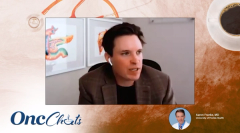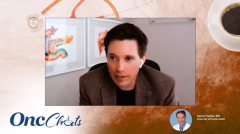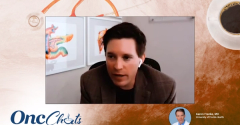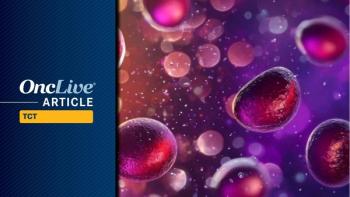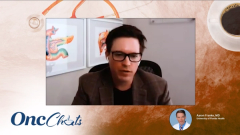
Traveling Through the Lung Cancer Treatment Paradigm: Moving Cellular Therapies Across Settings
In this first episode of OncChats: Traveling Through the Lung Cancer Treatment Paradigm, Aaron Franke, MD, discusses the exploration of cellular therapies in non–small cell lung cancer.
Episodes in this series

In this first episode of OncChats: Traveling Through the Lung Cancer Treatment Paradigm, Aaron Franke, MD, of the University of Florida Health, discusses the exploration of cellular therapies in non–small cell lung cancer (NSCLC).
"I just wanted to briefly bring up the segue of adoptive cellular therapies from the hematological space, where they kind of made their boom about 7 years ago, into the solid tumor space—specifically, NSCLC.
[Although] immune checkpoint inhibitors have obviously revolutionized the advanced and metastatic settings of NSCLC, and now have even made their way into the surgically curable setting in terms of improving patient outcomes, the majority of our patients either do not benefit or gain the long-term benefit. Eventually, [these patients] relapse and succumb to their disease, despite up-front good therapies and maybe about one-third of our patients getting these long-lasting responses. After immunotherapies have failed—and the patient has not failed, the treatment has failed, we must remember the nomenclature is important here when we’re talking to patients—there are very little data for post-immunotherapy drugs and what regimens are efficacious. However, even if we go back to the single-agent chemotherapies, docetaxel or ramucirumab [Cymraza] options, post immunotherapy or not, these treatments have very marginal efficacy. Although it’s still statistically significant, how clinically beneficial it is and how long lasting it is, is again measured on the order of months.
As such, trying to find something to reinvigorate the immune system or, I should say, satiate the T-cell exhaustion, [to] overcome the immunotherapy checkpoint inhibitor resistance that's either acquired or inherent to the tumor, is something that adoptive cell therapies are looking [to address]. These [products] range from tumor-infiltrating lymphocytes [TILs], T-cell receptor engineering, CAR T, and [other approaches]. Generally, this is just a personalized treatment strategy that is going to isolate a patient's own immune cells; [it is] followed by an ex vivo expansion and re-infusion in the setting of TIL therapy, [for example]. The rationale for this is really trying to turn what we call ‘cold’ tumors ‘hot’ by essentially maximizing the host antitumor defenses in response and upregulating the antigenic proliferation or response to the tumor-related proteins in the lung cancer that was otherwise deemed cold and nonresponsive based on the microenvironment.
We saw the first [phase 1] study [NCT03215810] on [TIL therapy], from Ben Creelan, MD, of Moffitt Cancer Center, and the early phase 1/2 data, and if you look at the overall outcomes...you see an objective response rate in [3 of 13] of patients, with [2] of these patients having a complete response and a disease control rate of about 65%. Again, [this is being seen] in patients who have already progressed on at least 1 line of therapy, including an immune checkpoint inhibitor. In the absence of other cytotoxics and immune checkpoint inhibitors that can overcome this resistance, looking at patients who may be that may be eligible for this kind of therapy, despite the nuances of it, I would say that this is a clinically relevant, very attractive and encouraging target [that is] reinvigorating a once-exhausted immune system for those patients who progress on our first-line therapies."
Check back next Wednesday for the next episode in this series.



